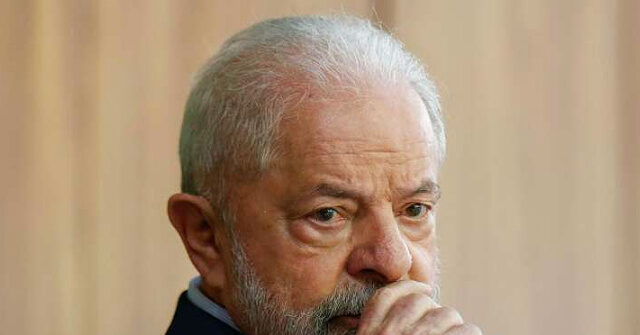Top News
Brazil Begins ‘Defensive Actions’ on Border over Fears of Venezuela Invasion of Guyana

One of the world’s more overlooked simmering conflicts came to a boil on Wednesday, as Brazil announced “intensified defensive actions” — in other words, massing troops and armor — along its northern border to repel a possible invasion of Guyana by Venezuela.
The Brazilian Ministry of Defense said it has been “monitoring the situation” in Guyana and decided a “greater military presence” was necessary. Brazilian intelligence officials allegedly believe a Venezuelan invasion is imminent, although they have not publicized their evidence for reaching this conclusion.
At issue is a region located between Venezuela and Guyana known as the Essequibo after the name of the major river running through it. Sprawling over 61,000 square miles, the Essequibo covers nearly two-thirds of Guyana’s territory, but Venezuela claims the entire area as its property.
In short, Venezuela argues its historical boundaries extended to the Essequibo River but the land was taken away during the British colonial era. The U.S. government of the 1890s believed Venezuela had a legitimate claim that should be resolved through arbitration. The British resisted the idea — and thought even more territory should belong to British Guyana — but eventually agreed to allow a boundary commission organized by the U.S. Congress to settle the issue.
The commission rejected Britain’s more expansive claims but left the bulk of the Essequibo within Guyana’s borders. The affair was considered at the time to be the first great American flex of global power.
As luck would have it, the Essequibo region is extremely valuable. The British wanted its gold, but subsequent explorations revealed the land is a veritable superstore of useful minerals, including copper, iron, nickel, tungsten, and bauxite.
The hills are sprinkled with diamonds, too, and in the 2000s offshore explorers struck oil. There are 46 known oil fields in the region, four of them discovered in just the past year. Geologists believe its total oil reserves could exceed 11 billion barrels. The trees are also valuable.
On Sunday, Venezuela plans to hold a referendum on seizing the entire Essequibo region and turning it into a Venezuelan state. Dictator Nicolas Maduro has mobilized his socialist regime to get the referendum passed.
Guyana has asked the International Court of Justice (ICJ) to intervene and halt the referendum, which it sees as an exercise in forced annexation. The ICJ is due to hand down its ruling on Friday.
The indigenous residents of Essequibo are apprehensive that Venezuela will invade but also unhappy with the government of Guyana for keeping them out of the loop. Almost everything the residents know about the dispute is reaching them through social media.
“The government … only comes when they want our votes. Now, there’s this dispute. Nobody is here to tell us, ‘These are the issues. This may come. Let us prepare for it. We are negotiating. We hope for the best.’ Nobody is coming to tell us that,” Essequibo indigenous leader Michael Williams complained to the Associated Press (AP) on Wednesday.
The AP noted that Essequibo’s indigenous people may have some problems with the government of Guyana, but they do not see themselves as Venezuelans, contrary to propaganda claims made by the Maduro regime.
In September, Guyana solicited bids from six oil companies to develop offshore fields in the Essequibo region. Venezuela denounced the bidding as “illegal” and accused Guyana of trying to “allocate maritime areas pending delimitation between both countries.”
The U.S. State Department stood behind Guyana, endorsing its right to develop its own natural resources and rejecting Venezuela’s “efforts to infringe upon Guyana’s sovereignty.”
Last Friday, Guyana’s President Mohamed Irfaan Ali helicoptered out to the Pacaraima mountains near the Venezuelan border and defiantly raised his national flag, a move interpreted as a deliberate provocation by Venezuela.
#Atención Irfaan Ali iza la bandera de Guyana en una montaña de 670 mt de altura en la Serranía de Pacaraima, Territorio Esequibo, muy cerca del límite de facto #24Nov #MiMapa pic.twitter.com/IfsT3Rp3yZ
— Mi Mapa de Venezuela incluye nuestro Esequibo (@AntroCanal) November 24, 2023
Guyana’s Vice President Bharrat Jagdeo announced last week that teams from the U.S. Department of Defense would be visiting Guyana throughout December. President Ali said during the flag-raising ceremony that he anticipated “greater collaboration” with Guyana’s “international partners” to resolve the Essequibo issue.
“Our overall strategy is that there is nothing to be alarmed about. There is absolutely nothing to fear. We are doing everything in accordance with international guidelines, and we believe that Venezuela will not act recklessly,” Ali said, angering Venezuela further.
The Organization of American States (OAS) joined the U.S. in opposing Venezuela’s referendum, so many observers believe Maduro will back down from annexing or invading the Essequibo, even if his referendum passes.
Forbes speculated in mid-November that Maduro simply wants to exploit the border crisis to “solidify the legitimacy his authoritarian regime,” “gain political capital,” and “brand the opposition as traitors.”
“Regardless of actual intent, Maduro should remember two failed cases of territorial aggrandizement to salvage faltering regimes which demonstrate how ephemeral weaponized nationalism really is; the Argentine Junta’s 1982 invasion of the Falklands, and Saddam Hussein’s 1990 invasion of Kuwait,” Forbes warned.
Read the full article here


















